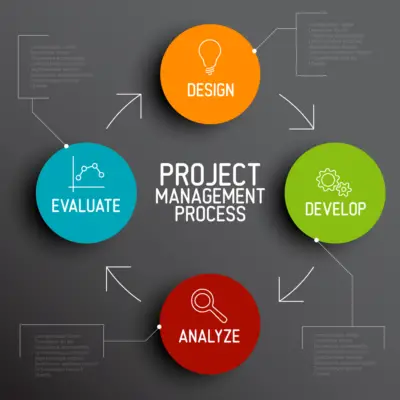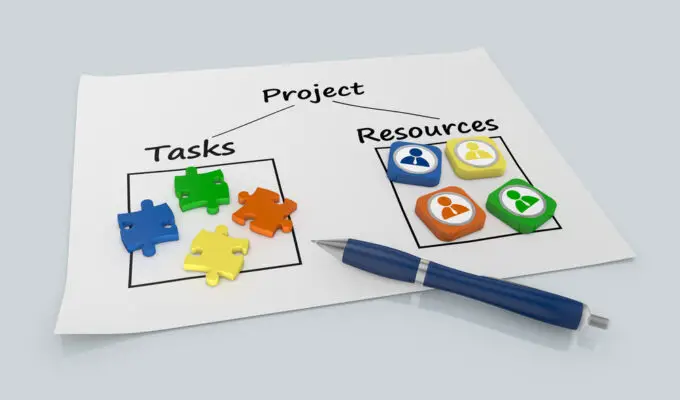This article aims to provide a concise and authoritative overview of the path towards becoming a project manager in the healthcare industry.
It will explore the definition of a healthcare project manager and highlight the education requirements and professional certifications necessary for this role.
Discuss the job outlook for healthcare project managers and outline the essential skills needed for a successful career.
Definition of a Healthcare Project Manager
Healthcare project managers oversee and manage various projects within the healthcare industry.
Their typical duties and responsibilities include:
- Developing project plans.
- Coordinating with different stakeholders.
- Monitoring project progress.
- Ensuring that projects are completed within budget and on time.
Healthcare project managers must possess strong organizational and communication skills to succeed in this role.
They should also have a solid understanding of healthcare regulations and protocols.
Additionally, they should have a background in project management and hold relevant certifications such as PMP (Project Management Professional) or Six Sigma.
In healthcare project management, professionals oversee and coordinate complex projects within the medical sector.
These projects can range from implementing new healthcare programs and adjusting policies to improving patient safety and ensuring quality care.
Project managers in this field require a strong knowledge of healthcare projects and project management abilities.
To excel in healthcare project management, professionals often pursue graduate degrees or certificate programs specializing in this field.
For example, Georgetown University offers a program called “Project Management for Healthcare Informatics,” which provides training in project management specifically tailored to the healthcare industry.
Other universities, such as Harvard University and Western Governors University, also offer degree programs and training in project management.
Healthcare managers are responsible for various tasks, including creating project charters, utilizing project management software, overseeing project contributors, and providing management on project status.
They must also be able to adjust policies and programs as needed, ensuring that projects are completed on time and within budget.
One widely used project management methodology in healthcare is the waterfall methodology, which follows a linear and sequential approach.
However, the agile methodology is gaining popularity due to its flexible and team-based approach, allowing for adjustments and revisions throughout the project.
Healthcare project management is a challenging yet rewarding field that requires combining technical skills, industry knowledge, and strong leadership abilities.
Professionals in the healthcare industry can anticipate a broad range of opportunities and high-paying leadership roles due to the increasing demand for healthcare projects.

Typical Duties and Responsibilities
Manager’s typical duties and responsibilities in the healthcare sector involve coordinating and overseeing various aspects of project implementation and execution.
They are responsible for creating project plans, setting goals and objectives, and ensuring that projects are completed on time and within budget.
Project managers in healthcare also need to collaborate with different stakeholders, such as healthcare professionals, administrators, and IT specialists, to ensure smooth communication and successful project outcomes.
Leadership skills are crucial for managers, who must motivate and manage teams throughout the project lifecycle.
Experience in project management and knowledge of the healthcare industry are highly valued by employers in this field.
Educational requirements for managers in healthcare vary but often include a bachelor’s degree in a related field, such as healthcare administration or business management.
| Duties | Responsibilities | Skills |
|---|---|---|
| Coordinate projects | Create project plans | Leadership skills |
| Oversee implementation | Set goals and objectives | Communication skills |
| Manage project teams | Ensure project completion | Time management skills |
Skills and Qualifications Required
Leadership, communication, and time management skills are some of the important qualifications required for project managers in the healthcare sector.
These skills are crucial for effectively leading a project team, ensuring clear communication among team members, and managing resources and deadlines.
In addition to these skills, managers in the healthcare industry must also possess a strong understanding of healthcare projects and administration.
They should know the specific requirements and regulations of their healthcare organization and have a business administration background.
Furthermore, project managers in healthcare should be familiar with the unique challenges and complexities of managing projects in healthcare facilities.
Salaries for healthcare project managers can vary depending on experience, qualifications, and the size and scope of their projects.
Education Requirements
Education requirements for a healthcare project manager typically include a high school diploma, followed by a bachelor’s degree in either business administration or health administration.
Additionally, obtaining an advanced degree such as an MBA, MHA, or MPH is highly recommended to advance in this field and increase job opportunities.
These educational qualifications provide individuals with the knowledge and skills to effectively manage and oversee healthcare projects.
High School Diploma
Acquiring a high school diploma is a prerequisite for individuals aiming to pursue a healthcare project manager career.
This foundational level of education provides the necessary skills and knowledge for individuals to succeed in this field.
Here are four reasons why a high school diploma is important for aspiring healthcare project managers:
- Time Management: High school education teaches students how to manage their time effectively, a crucial skill for project managers who need to meet deadlines and ensure the timely completion of projects.
- Project Handling: High school projects provide students with opportunities to develop their project management skills, allowing them to gain practical experience in planning, organizing, and executing tasks.
- Career Opportunities: Many entry-level positions in healthcare project management require a high school diploma as a minimum qualification. This credential increases job prospects and opens doors to further education and career advancement.
- Job Outlook: With the growing complexity of healthcare projects, the demand for skilled project managers is rising. Obtaining a high school diploma sets individuals on the path to enter this field and take advantage of its promising job opportunities.
In the subsequent section about bachelor’s degrees in business administration or health administration.
Individuals with a high school diploma can further enhance their knowledge and skills by pursuing a degree in these fields.
Bachelor’s Degree in Business Administration or Health Administration
After completing high school, individuals interested in becoming project managers in healthcare can pursue a bachelor’s degree in either business administration or health administration.
These fields provide a strong foundation in management principles and healthcare operations.
A bachelor’s degree in business administration focuses on developing skills in finance, marketing, and organizational behavior.
In contrast, a degree in health administration provides knowledge specific to healthcare systems, policies, and regulations.
These programs typically require healthcare management, strategic planning, healthcare finance, and quality improvement coursework.
Gaining a bachelor’s degree in either business administration or health administration equips individuals with the necessary knowledge.
These skills to understand the complexities of healthcare management and successfully navigate the project management landscape within the healthcare industry.
Transitioning to the subsequent section, an advanced degree such as an MBA, MHA, or MPH can further enhance one’s qualifications as a project manager in healthcare.
Advanced Degree (MBA, MHA, or MPH)
Pursuing an advanced degree such as an MBA, MHA, or MPH can further develop expertise and qualifications in healthcare management.
Obtaining an advanced degree offers several benefits for individuals interested in healthcare project management:
- In-depth knowledge: Advanced degree programs provide a comprehensive understanding of healthcare management principles, including strategic planning, financial management, and organizational behavior.
- Specialized focus: These programs often offer concentrations in healthcare project management, allowing students to gain specialized knowledge and skills in this area.
- Enhanced career prospects: Graduates with advanced degrees in health management are better positioned to secure leadership roles in healthcare organizations and pursue higher-level positions in project management.
- Professional recognition: Advanced degrees from reputable universities and certifications in project management from organizations like the Project Management Institute (PMI) can enhance credibility and open doors to healthcare project management jobs.
An advanced degree can significantly contribute to a successful career in healthcare project management.
Professional Certifications for Healthcare Project Managers
The Project Management Professional (PMP) Certification and the Certified Associate in Project Management (CAPM) Certification are two prominent professional certifications for healthcare project managers.
The PMP Certification, offered by the Project Management Institute (PMI), is widely recognized as a globally recognized standard for project management professionals.
On the other hand, the CAPM Certification is an entry-level certification that provides a foundation for project management principles and practices.

Project Management Professional (PMP) Certification
Acquiring the Project Management Professional (PMP) certification is essential to becoming a project manager in the healthcare industry.
This certification provides individuals with the necessary knowledge and skills to effectively manage healthcare projects.
To engage the audience, here are four key aspects of the PMP certification:
- Healthcare project manager training: The PMP certification offers specialized training in healthcare project management, focusing on the unique challenges and requirements of the industry.
- Certification for project managers: The PMP certification is globally recognized and validates an individual’s expertise in project management, making them more competitive in the job market.
- Project management careers: With a PMP certification, individuals can pursue various project management careers within the healthcare sector, such as managing electronic health record implementation or coordinating clinical trials.
- Responsibilities for healthcare projects: The PMP certification equips project managers with the skills to plan, execute, monitor, and control healthcare projects, ensuring successful outcomes and efficient resource allocation.
Obtaining the PMP certification, individuals can demonstrate their specialization in healthcare projects and effectively manage the status of various initiatives.
This certification is a solid foundation for those interested in further advancing their project management careers.
The following section will discuss the Certified Associate in Project Management (CAPM) certification as another option for aspiring healthcare project managers.
Certified Associate in Project Management (CAPM) Certification
The Certified Associate in Project Management (CAPM) certification demonstrates proficiency in project management principles.
This equips individuals with the foundational knowledge and skills to manage various initiatives effectively.
The CAPM certification is especially relevant for healthcare professionals seeking to become project managers in the healthcare industry.
Healthcare projects require careful planning and execution to implement new systems, processes, and technologies successfully.
Obtaining the CAPM certification, healthcare professionals understand the project management process, including project planning, risk management, and stakeholder communication.
With these project management skills, individuals can navigate the unique challenges of healthcare projects and drive impactful change within the industry.
This certification serves as a stepping stone for healthcare professionals looking to advance their careers as project managers in the healthcare sector.
It is essential to explore the job outlook for healthcare project managers to understand the importance of project management skills in the healthcare industry.
Job Outlook for Healthcare Project Managers
The salary range for healthcare project managers varies depending on factors such as experience, education, and location.
According to industry data, the average salary for healthcare project managers is $80,000 to $120,000 per year.
However, it is important to note that salaries can be higher for individuals with advanced degrees and extensive experience in the field.
Salary Range for Healthcare Project Managers
Salaries for healthcare project managers vary depending on factors such as experience, location, and the size of the healthcare organization.
Here are some key points to consider regarding the salary range for healthcare project managers:
- Average Salary: The average annual salary for healthcare project managers ranges from $75,000 to $120,000.
- Experience: Project managers with more experience typically earn higher salaries, with senior-level positions offering potential earnings of $150,000 or more.
- Location: Salaries can vary based on the cost of living in different regions. For example, project managers in major cities tend to earn higher salaries than those in rural areas.
- Education and Certification: A project management education and professional certifications such as PMP (Project Management Professional) can increase earning potential.
A career in project management offers competitive salaries, and entry-level healthcare project manager positions provide a solid foundation for growth and advancement in the healthcare industry.
Essential Skills Needed for Successful Careers as a Healthcare Project Manager
Leadership and problem-solving skills are essential for successful careers as healthcare project managers.
Effective leadership allows project managers to inspire and motivate team members, set clear goals, and make informed decisions.
Additionally, strong problem-solving skills enable project managers to identify and address challenges, find innovative solutions, and ensure the successful completion of projects.
Leadership Skills
Developing effective leadership skills is crucial for individuals aspiring to become project managers in the healthcare industry.
Being a healthcare project manager requires leading teams and coordinating efforts to ensure the successful execution of projects that directly impact patient care.
The following four key leadership skills are essential for healthcare project managers:
- Problem-solving skills: Healthcare projects often involve complex issues that require critical thinking and problem-solving skills to identify and address challenges.
- Interpersonal skills: Effective communication and collaboration with team members, stakeholders, and healthcare professionals are crucial for the smooth functioning of projects.
- Organizational skills: Healthcare project managers must have strong organizational skills to develop and implement detailed project plans, manage resources efficiently, and meet project deadlines.
- Knowledge of project management principles: Understanding and applying project management principles, such as defining project goals, creating project schedules, and monitoring project progress, is essential for successful project management in the healthcare industry.
Problem-Solving Skills
Problem-solving skills are crucial in the healthcare industry as they enable individuals to identify and address complex issues that may arise in patient care and project execution.
In the healthcare sector, project managers play a vital role in ensuring the quality of care and successful completion of healthcare projects.
Problem-solving skills are essential for project managers in healthcare as they allow them to analyze situations, devise solutions, and implement effective project plans.
These benefits demonstrate the significance of problem-solving skills in the healthcare sector, emphasizing the need for project managers to possess this essential skill to ensure the successful execution of healthcare projects and the delivery of high-quality patient care.
Frequently Asked Questions
What Are Some of the Typical Challenges Healthcare Project Managers Face in Their Day-To-Day Work?
Healthcare project managers face typical challenges in their day-to-day work, including managing complex stakeholder relationships.
Dealing with tight budgets and limited resources, ensuring compliance with regulatory requirements, and navigating the constantly evolving healthcare landscape.
Are There Any Specific Regulations or Standards That Healthcare Project Managers Need to Be Familiar With?
Healthcare project managers must be familiar with specific regulations and standards to carry out their responsibilities effectively.
These regulations and standards ensure compliance, quality, and safety of healthcare project management.
Can You Provide Examples of Specific Healthcare Projects Project Managers in This Field Might Be Involved In?
Healthcare project managers may be involved in various projects, such as implementing electronic health record systems.
Managing the construction of healthcare facilities or coordinating quality improvement initiatives in healthcare organizations.
What Are the Potential Career Advancement Opportunities for Healthcare Project Managers?
Potential career advancement opportunities for healthcare project managers include moving into higher-level project management roles, such as senior project manager or program manager.
They may also have the opportunity to specialize in a specific area of healthcare project management, such as IT or construction project management.
Are Any Specific Software Tools or Technologies That Healthcare Project Managers Should Be Proficient In?
Proficiency in specific software tools and technologies is essential for healthcare project managers.
These tools enable efficient project management, data analysis, communication, and collaboration within the healthcare industry, contributing to successful project outcomes and improved healthcare delivery.

Conclusion
Becoming a project manager in healthcare requires a solid educational background and professional certifications.
The job outlook for healthcare project managers is promising, with a growing demand for skilled professionals.
To be successful, individuals must possess essential skills such as leadership, communication, and problem-solving abilities.
Acquiring the necessary qualifications and developing these key skills, aspiring project managers can establish a successful and fulfilling career in healthcare project management.

Chris Ekai is a Risk Management expert with over 10 years of experience in the field. He has a Master’s(MSc) degree in Risk Management from University of Portsmouth and is a CPA and Finance professional. He currently works as a Content Manager at Risk Publishing, writing about Enterprise Risk Management, Business Continuity Management and Project Management.

